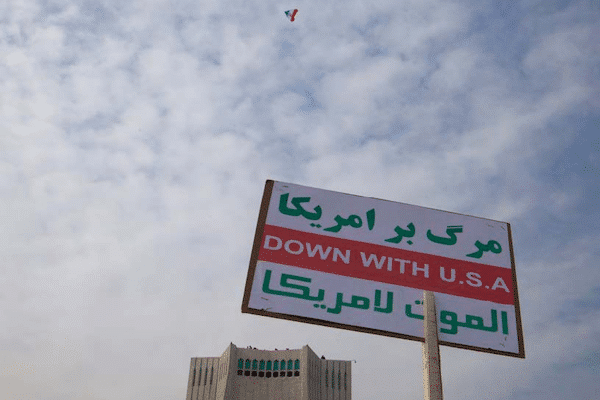It is impossible to predict what will happen in West Asia. Impossible to know whether the United States will conduct a military strike against Iran, which has already faced the full brunt of a U.S.-driven hybrid war against it for the past seven decades. The current flashpoint is over the Joint Comprehensive Plan of Action (JCPOA), negotiated between and signed in 2015 by Iran, the five permanent members of the UN Security Council (China, France, Russia, the United Kingdom and the United States), Germany, and the European Union. The JCPOA attempted to deal with tensions ramped up by the United States and its allies (mainly Saudi Arabia, the UAE and Israel) against Iran’s nuclear policy. Iran, in good faith, agreed to the protocols established by the JCPOA even though it has always said that it does not have a nuclear weapons policy.
What has irked the United States and its regional allies has been Iran’s regional role. Since the Iranian Revolution of 1979, Iran had been hemmed in by Iraq–headed by Saddam Hussein, who led a war of aggression against Iran from 1980 to 1988–and Afghanistan–whose Taliban regime in particular was decidedly against Iran. Two U.S. wars against Afghanistan (2001) and Iraq (2003) destroyed Iran’s two mortal enemies. These were U.S. wars that were won by Iran. Iran re-established its contacts beyond its borders and quickly became an important regional power. The United States then tried to send Iran back to its borders by attacking Iran’s allies and by attacking Iran itself. Syria faced U.S. legislative action from 2004, while Israel conducted a brutal war against Lebanon in 2006. It was in this context that the U.S. put the ‘nuclear threat’ on the table and started a unilateral and UN sanctions regime against Iran. The JCPOA was a mechanism to roll back on the dangerous tension produced by the United States in the decade since it began is wars on Afghanistan and Iraq.
Frustration with the resilience of Iran and with its ties to China and Russia has pushed the regional allies of the U.S.–and the U.S. itself–to renew threats against Iran. The hybrid war against Iran has included economic sanctions, sabotage, and assassinations, as well as an information war. To break through the information barrier, Tricontinental: Institute for Social Research interviewed Professor Seyed Mohammad Marandi of the University of Tehran, where he teaches English Literature and Orientalism and is the Dean of the Faculty of World Studies. This conversation focuses on the unilateral U.S. sanctions policy against Iran, on Iran’s resilience, and on Iranian relations with China and Russia.
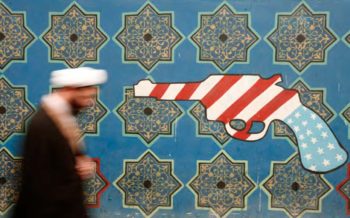
An Iranian cleric walks past a mural on the wall of the former U.S. embassy. Tehran, February 2007. Morteza Nikoubazl/Reuters
Terrible sanctions and threats of war must have set the Iranian population on edge. Could you give us a sense of the mood in Iran at this time? Is there a sense of isolation in the population?
U.S. President Donald Trump himself admits that he is waging economic war against Iranians. He also calls his instrument of war by a revealing phrase: ‘brutal sanctions’. Therefore, he admits that he is brutalising the Iranian population. This is–itself–a war crime. In addition, Trump regularly threatens Iranians. He repeatedly says that he may obliterate the country, which essentially means using weapons of mass destruction. This is a threat to kill Iranians through a nuclear holocaust. On 19 May 2019, for instance, Trump said on Twitter, ‘if Iran wants to fight, that will be the official end of Iran’. Then, in a series of tweets on 25 June, Trump wrote that the United States would attack Iran with ‘great and overwhelming force. In some areas, overwhelming will mean obliteration’. That is a genocidal threat.
So, when you have this sort of regime constantly threatening Iran, obviously people take notice. But I would add that in recent months, people have become less concerned than before. When the new sanctions that have been increasing with each week these last few months first kicked in, there was a run on the market and our currency fell rapidly. But, in recent months, the currency has stabilised, and the market is stable. Life is more difficult, but there is a new normality now.
I do not think that there is a sense of isolation for us in Iran because countries like Russia and China are moving closer to Iran. We have Russian leaders and Chinese official media outlets making statements in support of Iran. In May, when these sanctions began, Iran’s Foreign Minister Javad Zarif was in Beijing. The Chinese State Councillor Wang Yi said that China ‘resolutely opposes the U.S. implementation of unilateral sanctions and so-called long-arm jurisdiction’. Long-arm jurisdiction is a legal conceit that allows a country–in this case the United States–to argue that it can make legal claims based on its own laws, not on international law against other countries.
Most significantly, Wang Yi said that China ‘supports the Iranian side to safeguard its legitimate rights and interests’. In June, China’s President Xi Jinping and Russia’s Vladimir Putin met in Moscow. They discussed the situation around Iran and wrote a powerful statement of support. They said that both countries ‘firmly oppose the imposition of unilateral sanctions by any states’–the finger directly pointed at Washington, DC. China, Russia, and Iran are moving closer to each other.
Iran’s regional allies are sticking close together and remain very faithful to Iran as well. Despite nonstop pressure and threats from the United States, the governments in Iraq, Lebanon, Turkey, Qatar, and Oman remain very close to Iran, while Iranian-allied resistance forces from the Red Sea to the Mediterranean to the Hindu Kush see eye-to-eye with Iranians on strategic issues.
Even the western media, despite its traditional hostility towards Iranians and Iran, is finding it difficult to justify the actions of the Trump regime, especially since many of them despise him. Editorial boards of several key newspapers came out openly against Trump’s threats to bomb Iran.

Young Iranian boys look at a toy that depicts the character “Spiderman” at a shopping centre on the island of Kish in the Persian Gulf. Kish became the country’s first free trade zone and the new gateway to Iran in 1982, being 17 km off the southern shore of mainland Iran. Kish, August 2008. Morteza Nikoubazl/Reuters
The sanctions that the U.S. has now placed on Iran do not have the imprimatur of the United Nations or of international law. What is the Iranian understanding of the U.S. sanctions? Could you tell us a little about the impact of these sanctions based on concepts such as long-arm jurisdiction?
The sanctions do not have the backing of international law or the United Nations, so they are illegal even by their own standards. The United States bullies other countries by threatening them with sanctions if they do not follow the U.S. lead against Iran. Waivers from the new U.S. unilateral sanctions had been given to South Korea, Japan, Turkey, and India to buy Iran’s oil–and then they were allowed to lapse. These countries buckled to U.S. threats, not because they have to honour any international legal commitment, but because of the financial and political power of the United States.
Since the global financial system is centred around financial institutions deeply influenced by the United States, and since the U.S. dollar effectively plays the role of the global currency, it gives the U.S. government enormous leverage against many governments around the world. The Europeans, the Australians, and other so-called Western countries do not agree with Trump’s policies towards Iran. In May 2019, the Europeans released a statement against the new sanctions from the United States. This statement was signed by the European Union’s Foreign Policy Chief Federica Mogherini and by the Foreign Ministers of France (Jean-Yves Le Drian), Germany (Heiko Maas), and the UK (Jeremy Hunt). They ‘regretted’, they were ‘concerned’, but at no point did they threaten to do anything. They do not want to stand up to the United States. Comments about a new payment mechanism–INSTEX–remained in the air. It could not be put into place as a meaningful tool. In fact, Iran’s president Hassan Rouhani called it an ‘empty instrument’.
There is a certain tribalism–if not racism, a certain kind of Eurocentrism that binds these countries together. When Trump threatens Iran with obliteration, no Western leader, no European parliament member, no major political figure in Europe is willing to criticise, let alone condemn, Trump. His threats of a nuclear holocaust have been met with silence.
Nevertheless, while the impact of the sanctions is significant, there are countries that are increasingly moving closer to Iran and resisting the United States out of principle or because they know that they could be next on the hit list if the United States succeeds. A group of 25 countries has come together to protest the use of unilateral sanctions by the United States. It is clear that other states want to join this bloc, but they are as yet not prepared to stand up to the United States in public.
What the United States is doing against Iran is not something unique to Iran. You have seen a long history of attempts to destabilise any country that has not accepted U.S. hegemony. In the case of Iran, the government was overthrown by a CIA coup in 1953, the Shah of Iran was propped up by U.S. assistance from 1953 to 1979, and then the U.S. has attempted since the Iranian revolution to overthrow the government. The United States–along with Saudi Arabia–urged Saddam Hussein to have Iraq carry on a war against Iran for eight years, during which time it provided the Iraqi forces with chemical weapons which were used extensively against Iran and the Iraqi opposition.
Trump’s policy is along the grain of this long history. This is the story of Iran, but it is not unfamiliar. Since the fall of the USSR, a set of states–often very dissimilar with one another–have faced the brunt of U.S. force, being called ‘rogue states’, ‘pariah states’, ‘failed states’, ‘state sponsors of terrorism’, and so on. These include–with different levels of pressure–Afghanistan, Cuba, Iran, Iraq, Libya, North Korea, Sudan, Syria, Venezuela, Yemen, Lebanon, and Yugoslavia. Several of these states are no longer on the list, because they have either been obliterated (Yugoslavia) or they have faced regime change (Afghanistan, Iraq, and Libya).
A current example of this U.S. hybrid war policy is Syria, where the U.S. has supported extremists in order to destroy the country. We are fortunate that a part of the 2012 U.S. Defence Intelligence Agency document is available in the public domain. This document–which was circulated in August 2012–says that ‘there is the possibility of establishing a declared or undeclared Salafist principality in Eastern Syria’. The document says that this is what the powers that support the opposition–with the U.S. in the lead–want to do to ‘isolate’ the Syrian government.

Iranian protestors wear masks as well as hats with the U.S. flag and Israeli flags at a rally to mark the 35th anniversary of Iran’s Islamic Revolution. Tehran, February 2014. Morteza Nikoubazl/The New York Times
At the time that this document was produced, the head of the Defence Intelligence Agency was Michael Flynn. In 2016, on al-Jazeera, Flynn admitted that the U.S. took a wilful decision to support its allies–such as the Persian Gulf Arab family dictatorships and Turkey–in supporting the extremists. Yes, he said, ‘we’ve allowed these extremist militants to come’. The U.S. facilitated the entry of extremists who created a range of organisations–including ISIS–that tore Syria apart.
What they did to Syria is what they did to Libya, and what they want to do to Iran. Iran is familiar with all of this. This kind of pressure has existed since the Revolution, but the strength of the Islamic Republic cannot be compared to any of these other countries.
The United States is unrelenting. It continues to squeeze Iran not just on the nuclear programme but on Iran’s relations, from West Asia to the Mediterranean Sea. The demands from Washington–on behalf of the Arab regimes in the Persian Gulf and Israel–seem endless. What is the attitude of the Iranian government towards these demands?
Currently, the United States is concerned about losing its dominant role in the region. It has been unable to undermine Syria; it has failed in Yemen despite standing alongside the Saudis in imposing starvation on the population and providing Saudi Arabia with all sorts of weapons along with all the other western countries. They failed to impose a government of their own choosing in Iraq as well as in Lebanon, while in Afghanistan they do not have the sort of control they were hoping for. So, the American government is now in a weak position and all they have are two family dictatorships–the Saudis and the Emiratis–as well as the Israeli regime.
The demands that the United States is making are, of course, unacceptable to the Rohani administration in Tehran. The United States wants a renegotiated nuclear deal which Iran sees as unacceptable. The Rouhani government sees the U.S. demand for renegotiation as appeasement. The Iranian government believes that there is no sane reason to negotiate with a government–the United States–that is unwilling to abide by its own current obligations, because it will only encourage rogue behaviour and bullying from the U.S. and its allies. On the other hand, all of the inconsistencies in the statements coming from the White House are further reason not to negotiate. The fact that they sanctioned the country’s leaders–including the Foreign Minister–is also evidence that the U.S. government is not serious. Even the French recently admitted that the U.S. is not serious about the negotiations. In early June, a French defence official told CNN that there is ‘no signal that the U.S. is interested in dialogue’.
In any case, Iran is not willing to renegotiate the JCPOA. Iran is not willing to give up its military deterrence that protects the country from U.S. attacks. Iran is not willing to end its support for its regional allies, because it knows that the extremist Wahhabi groups that the U.S. and its allies have been backing will subsequently gain the upper hand.
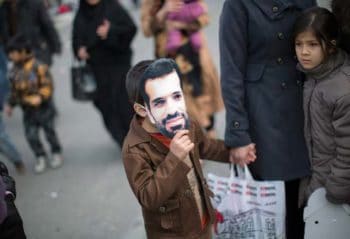
During a rally to mark the 35th anniversary of Iran’s Islamic Revolution, an Iranian boy holds a mask of Iranian nuclear scientist Mostafa Ahmadi-Roshan, who was killed in a bomb blast in Tehran in 2012. Tehran, February 2014. Morteza Nikoubazl/The New York Times.
No one doubts that the U.S. military is far and away the most powerful armed force not only in the world, but also in the region. U.S. bases encircle Iran, and U.S. warships continually patrol just outside of Iran’s territorial waters. Iran has shown that it can shoot down drones, but surely will not be able to defend against a massive bombardment. That is why Iran has said that it does not want war but remains resolute that it will not back down. What is the source of this resilience in the government and amongst the population?
The Revolution in Iran was about independence, dignity, sovereignty, and self-determined governance. Our system of government recognises public participation in politics and respects our own values and beliefs. Therefore, a strong sense of resolve has been created among ordinary Iranians against hostility from countries like the United States. The United States of America is arguably the most powerful country in the world, but it has vulnerabilities. The U.S. public is tired of war. The appetite for another major confrontation does not exist in the country. The U.S. national debt is over $22 trillion, which would only escalate if the U.S. starts another major war. In addition, the U.S. cannot move its armed forces from all over the world towards Iran. These forces are tied down in other theatres. The U.S. currently is engaged in military escalation with rising powers like China and Russia. The U.S. is already overstretched across the board.

Iranians take photographs and record videos with their mobile phones and tablets during a live concert by the Liberty Square rock band in an open area of the Niavaran Cultural Centre. Tehran, May 2014. Morteza Nikoubazl/ZUMA Press.
I also believe that the downing of the most sophisticated U.S. drone, which some say costs $200 million, by an Iranian-made surface-to-air missile that costs roughly $20,000, is a sign that Iran’s military capabilities are much more advanced than the United States had anticipated. Iran is not a small country; it is mountainous and has a population of over 80 million people. It has been preparing itself for a possible attack since the U.S. war on Iraq. It has many underground installations alongside the Persian Gulf, on the islands, near the strait of Hormuz as well as the Gulf of Oman. In these well-protected secret facilities, it stores an enormous missile defence capability as well as other well-protected defensive and offensive capabilities. Therefore, I would not underestimate Iran’s potential to strike at U.S. targets. It is important to underline that in case of a U.S. attack on Iran, the oil and gas facilities in the Persian Gulf region as well as the tankers and the ships would all be destroyed, and no one can really protect them. They are vulnerable and their destruction would lead to a global economic meltdown, something unprecedented in modern history.
In addition to that, Iranian allies would swiftly drive the United States forces out of Afghanistan, Iraq, Syria, and Lebanon, while the Saudi and Emirati regimes would collapse quickly, as they are totally dependent on oil. The Emirates has a population of 1 million citizens along with 7 million foreigners. If the oil and gas facilities and other infrastructure are destroyed, then I do not think the regime would last more than a couple of weeks. We will see the Yemeni armed forces push into Saudi Arabia and the indentured servants rise up in the Emirates and perhaps another push from Iraq into Saudi Arabia. If a ‘hot war’–a war using military force as its primary strategy–is imposed on Iran by the U.S., there would be an enormous regional war and millions of people would immediately leave the Arabian Peninsula for Europe. The global economic depression would also have enormous consequences across the world. So, I believe that the U.S. recognizes that a war with Iran is not one that it can win. Everyone would lose, but the U.S. has so much more to lose than Iran.
In Tehran’s skyline, one sees a large number of Chinese cranes. Certainly, Chinese investment in Iran is growing, with China seeing Iran as an integral part of the Belt and Road Initiative. Could you assess the role of China in Iran? How is China seen in Iran? What kind of Chinese projects do you think will become integral to Iran’s development agenda?
The Iranian-Chinese relationship has been growing for a number of years now and the same is true for Iranian-Russian relations. Keep in mind certain key facts. First, the U.S. has imposed pressure on China, and it has initiated a trade war. Second, the U.S. has all but destroyed U.S.-Russia relations, with U.S. sanctions against Russia ongoing. Third, the U.S. is waging economic warfare against Iranians, which impacts China and many other countries because of the difficulty for them to purchase Iran’s oil and to continue normal trade. These pressures have brought these countries closer to each other, as they all recognize that any U.S. success against one of these countries is detrimental to the interests of the others and that any U.S. failure strengthens all three nations.
The countries had already been developing closer ties before the pressure intensified over the past few years. But U.S. behaviour has increased the pace of convergence. The Belt and Road Initiative has also been an enabling factor to further that convergence and increase future ties, especially the economic ties between Iran, Central Asia, and China. The trip by the Iranian Speaker of Parliament Dr. Ali Larijani to China a few months ago was a turning point in the relationship, and the more recent meeting between President Rouhani and President Xi consolidated this.
The Chinese are refusing to halt their oil trade with Iran and the two countries are going to increase their economic relationship significantly over the next couple of years. This is a major loss to the United States of America and to the European Union, because by pushing Iran away from the West they strengthen and unite their rivals, such as China and Russia. Whereas the U.S. position in the region is declining, this relationship between Iran and China will obviously have an effect on Chinese relations with Syria, Iraq, Afghanistan, Lebanon, and Yemen in the future, if not other countries as well. Also, Central Asia–lying between Iran, Russia, and China–will move closer to these three countries the more they cooperate with each other.
The Russian intervention in Syria in 2015 stopped all U.S. plans to bomb Damascus. Russia has been stern about the U.S. provocations against Iran. Do you think that the Russians will provide Iran with the kind of shield that they provided to Damascus and that they have provided to Venezuela?
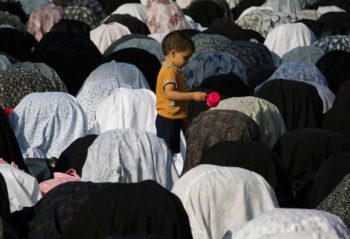
A young Iranian boy plays as his mother prays at the shrine of Hazrat-e Massoumeh, granddaughter of Prophet Mohammad during the festival of Eid-al-Fitr in the holy city of Qom, 120 km south of Tehran. Qom, August 2013. Morteza Nikoubazl/The New York Times.
One cannot compare Iran with Syria. In fact, it was Iran that saved Damascus. The Russians came in when it was becoming clear that the Syrian government wouldn’t be overthrown. The Russians played a very important role in Syria, and the world should be grateful for the Russian, Iranian, and Hezbollah effort to help the Syrians defeat the extremists. But Iran is much stronger than Syria or Venezuela or Libya or Vietnam, or all of them combined. I think the downing of the U.S. drone was symbolic of Iran’s capabilities and determination. This, alongside the fact that the country is strategically located alongside the world’s main source of fossil fuel–the Persian Gulf region–empowers Iran in a unique way.
What prevents the United States from attacking Iran is definitely Iran’s internal strength and its regional capabilities, but obviously Iran’s close relationship with the Russians and the Chinese significantly strengthens Iran’s hand too.
When the U.S. cut the waivers on trade between Iran and India, Japan, and South Korea, it squeezed these economies. That is why Shinzo Abe of Japan has been keen to find an exit from the sanctions. India is also unhappy with the current drift towards war. Its investments at Chabahar are languishing. Do you feel that these countries–each with close relations to the U.S.–will break with U.S. policy and isolate Trump on his war path against Iran?
India, Japan, and South Korea have lost their markets in Iran as a result of U.S. pressure and bullying. We have to see which direction India ultimately takes regarding Iranian oil, but Japan and Korea have lost a great deal. While India’s investment in Chabahar is limited, it has enormous potential and is of major strategic importance for the country. If India bows to the U.S., China will use this opportunity to replace India altogether.
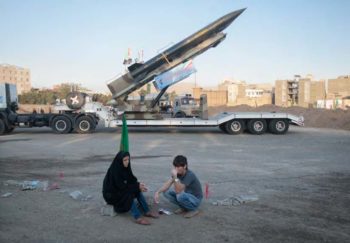
An Iranian couple rests as they sit in front of the Iranian surface-to-surface Zelzal missile while visiting a war exhibition to mark the Iran-Iraq war (1980-88) anniversary at a Revolutionary Guard Corps military base. Tehran, September 2011. Morteza Nikoubazl.
The Saudi and Emirati regimes are not inherently stable enough for anyone to confidently put all their eggs in their baskets. These countries are taking a big risk by replacing the oil from Iran with oil from Saudi Arabia and the UAE. In any case, these countries have lost the Iranian market or are in the process of losing it, and they’re losing influence in the region at the same that Iran’s influence in the region is growing. That loss is significant, and the longer they obey Trump in refraining from purchasing Iranian oil or ending economic ties with Iran, the better it is for the Chinese, who will consolidate their enhanced position in the Iranian market. If in the future the Japanese and the Koreans wish to return to the market, I think it will be very difficult for them to regain a foothold, because once you lose a market, regaining it is very difficult.
The U.S. sacrifices its so-called allies for its own selfish policies. These countries–especially Japan and South Korea–don’t have the will to stand up to the United States. With India it is still unclear, but so far they haven’t shown the necessary strength to protect their sovereignty and independence and to stand up to the United States for the sake of their own interests.
The European Union has been eager to continue to buy Iranian oil but has not been able to create a mechanism to do so. The Iranians have said that they will come up with a new means to trade oil with countries in Europe and elsewhere. Is there the possibility for such a means to be created?
The European Union has so far been spineless. The Iranians believe that if they were determined they could have abided by their commitments in the nuclear agreement. Their population, collectively, is greater than that of the United States; their economy, collectively, is greater than that of the United States, but the EU doesn’t have the will to stand up to Trump. Many don’t want to get in Trump’s bad books or make him angry, so they obey him. Of course, some even admire him.
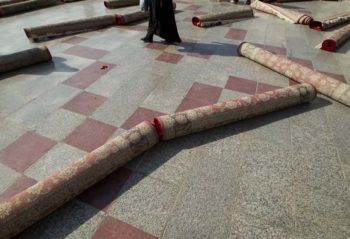
An Iranian woman walks around rolled-up carpets after the festival of Eid-al-Fitr at the shrine of Hazrat-e Massoumeh (granddaughter of Prophet Mohammad) in the holy city of Qom, 120 km south of Tehran. Qom, August 2013. Morteza Nikoubazl.
If this continues, the Iranians will have to decrease their commitments to the JCPOA. Until the Europeans make a decision to abide by their commitments, the Iranians will have no option but to move in that direction, and this weakens the whole nuclear deal. It is unacceptable to the Iranian public that Iran continues to be the only side that fully abides by its commitments and yet the U.S. wages war on its women and children and succeeds in making medicines inaccessible or too expensive for vulnerable people such as cancer patients.
While the Europeans have finally introduced a long-delayed financial payment mechanism, it is viewed as ineffectual and meaningless as long as an intimidated EU continues to refrain from purchasing Iranian oil and refrain from protecting European businesses from the United States. The Iranians are creating mechanisms to trade oil and conduct other business transactions with the Russians, Chinese, and friendly countries in the region. These countries have resisted U.S. intimidation and threats even as the Europeans are abiding by Trump’s demands and dictates in full. This is something that Iranians will not forget.

